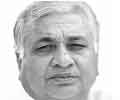27 May 2010, NewAgeIslam.Com
 Nafisa: You are young and the most eligible bachelor in Mecca. Men younger
than you are already married and many of them have children. Why don’t you
marry?
Nafisa: You are young and the most eligible bachelor in Mecca. Men younger
than you are already married and many of them have children. Why don’t you
marry?
Muhammad: My family is in straitened condition and I do not possess the
required wherewithal to afford marriage.
Nafisa: What would be your response if it is proposed to you to marry a
woman of beauty, wealth, status and honour, a woman who has full knowledge of
your financial difficulties?
Muhammad: Who could be such a woman?
Nafisa: The woman is Khadija, the daughter of
Khuwayled.
Muhammad: It is impossible that Khadija would agree to marry me. I know that
many rich and powerful people, the chiefs of tribes proposed to her and she
rebuffed them all.
Nafisa: I want to know your mind. If you agree to marry her then say so and
leave the rest to me. I shall arrange everything. -- Arif M. Khan
By Arif M. Khan
Khadija, the first and only wife of the Holy Prophet till 619 AD,
when she died, was a woman of substance. Ibn Saad, in his Tabaqat says that
whenever the caravans of the Meccan merchants set out on their journey,
Khadija’s cargo alone was equal to the merchandise of all other Meccan
traders.
The place is Mecca, the most important pilgrimage centre on the
Arabian Peninsula and the year sometime around 595 AD. A woman named Nafisa, who
is a close friend of the wealthiest of Meccan businesswomen Khadija approaches
Mohammad, a young man of 25. He is a scion of the Meccan chief Abdul Muttalib
and Nafisa proposes the man should marry her friend. Khadija was famous for her
business acumen and fabulous riches and was called Ameera (Princess), while the
young man had a great reputation and was admiringly described as “trustworthy”
(Amin) and “honest” (Sadiq) despite the fact that his family was passing through
difficult times and he was working for the lady as her business manager. History
has recorded the following dialogue between the two:
Nafisa: You are young and the most eligible bachelor in Mecca. Men younger
than you are already married and many of them have children. Why don’t you
marry?
Muhammad: My family is in straitened condition and I do not possess the
required wherewithal to afford marriage.
Nafisa: What would be your response if it is proposed to you to marry a
woman of beauty, wealth, status and honour, a woman who has full knowledge of
your financial difficulties?
Muhammad: Who could be such a woman?
Nafisa: The woman is Khadija, the daughter of
Khuwayled.
Muhammad: It is impossible that Khadija would agree to marry me. I know that
many rich and powerful people, the chiefs of tribes proposed to her and she
rebuffed them all.
Nafisa: I want to know your mind. If you agree to marry her then say so and
leave the rest to me. I shall arrange everything.
After consulting his family, Muhammad consented to the proposal and
Nafisa negotiated and settles his marriage with Khadija. The two entered into
wedlock a few days later. The marriage was solemnised about 15 years before
Muhammad’s ordainment as Apostle of God.
Khadija, the first and only wife of the Holy Prophet till 619 AD,
when she died, was a woman of substance. Ibn Saad, in his Tabaqat says that
whenever the caravans of the Meccan merchants set out on their journey,
Khadija’s cargo alone was equal to the merchandise of all other Meccan traders.
By all accounts, she was blessed with the proverbial golden touch – if she
touched dust, it turned into gold. Meccans acknowledged her business talents and
bestowed upon her the title of the Princess of the
Quraysh.
During the first 13 years in Mecca, when the Prophet and his small
band of followers suffered the worst persecution at the hands of the Meccan
nobility, Khadija was her husband’s main pillar of support. She is counted as
the first person to have declared her faith in Islam after the revelation. As a
wife she was not only a source of emotional comfort and solace, but placed all
her wealth at the disposal of the Holy Prophet. Many Muslim commentators hold
that it was through the wealth of Khadija that God Almighty made the Prophet
self sufficient and relieved him of the worries of earning a livelihood. The
Quran itself testifies, “Did we not find free of need” (93.8). Edward Gibbon, in
his classic The Decline and Fall of the Roman Empire, says, “In his
25th year he entered into the service of Khadija, rich and noble
widow of Mecca, who soon rewarded his fidelity with the gift of her hand and
fortune.”
Imam Hanbal and Tirmidi have reported that the Prophet often
remembered Khadija fondly and once this aroused the jealousy of young Ayesha,
who said, “But she was an old woman and God has compensated you with a better
wife.” The Prophet indignantly remarked, “No, this is not true. Khadija believed
in me when all others disbelieved, she held me truthful when others called me a
liar, she sheltered me when others abandoned me, and she comforted me when
others shunned me.”
And today the clerics of Deoband tell us that according to Islamic
law “it is prohibited (haram) for a family to accept a woman’s earnings”. But
the Holy Prophet had not only accepted the earning of his wife but publicly
acknowledged this with sincere gratitude.
Source: The Sunday Guardian




 Sultan Shahin
Sultan Shahin


0 comments:
Post a Comment